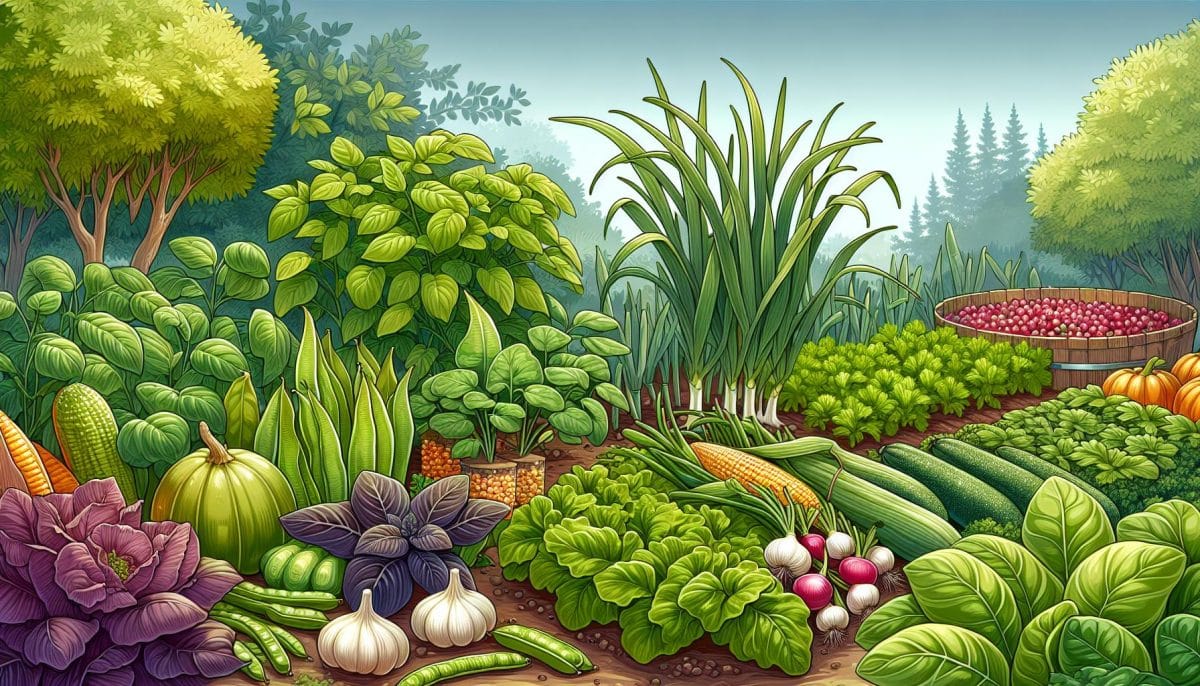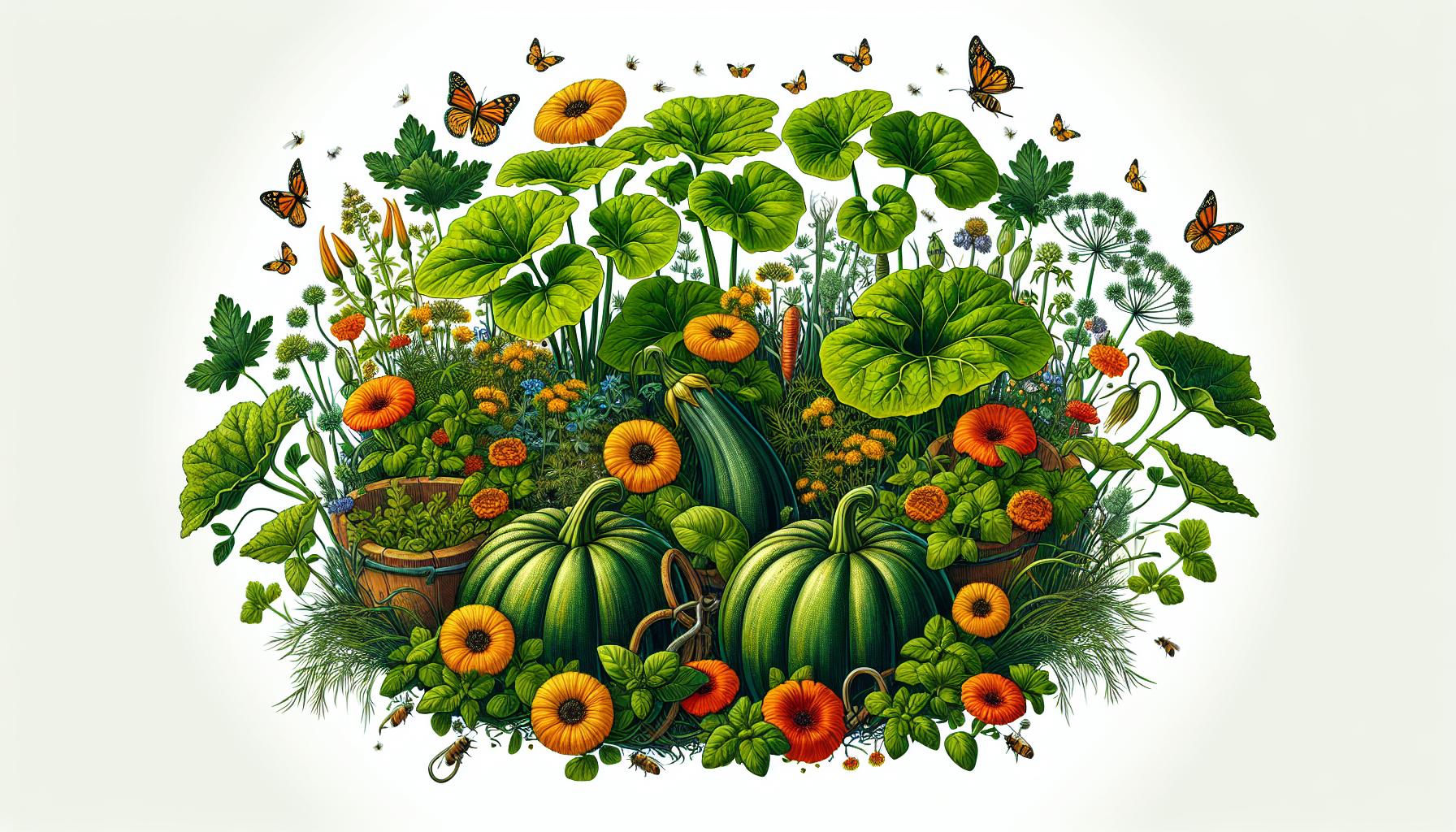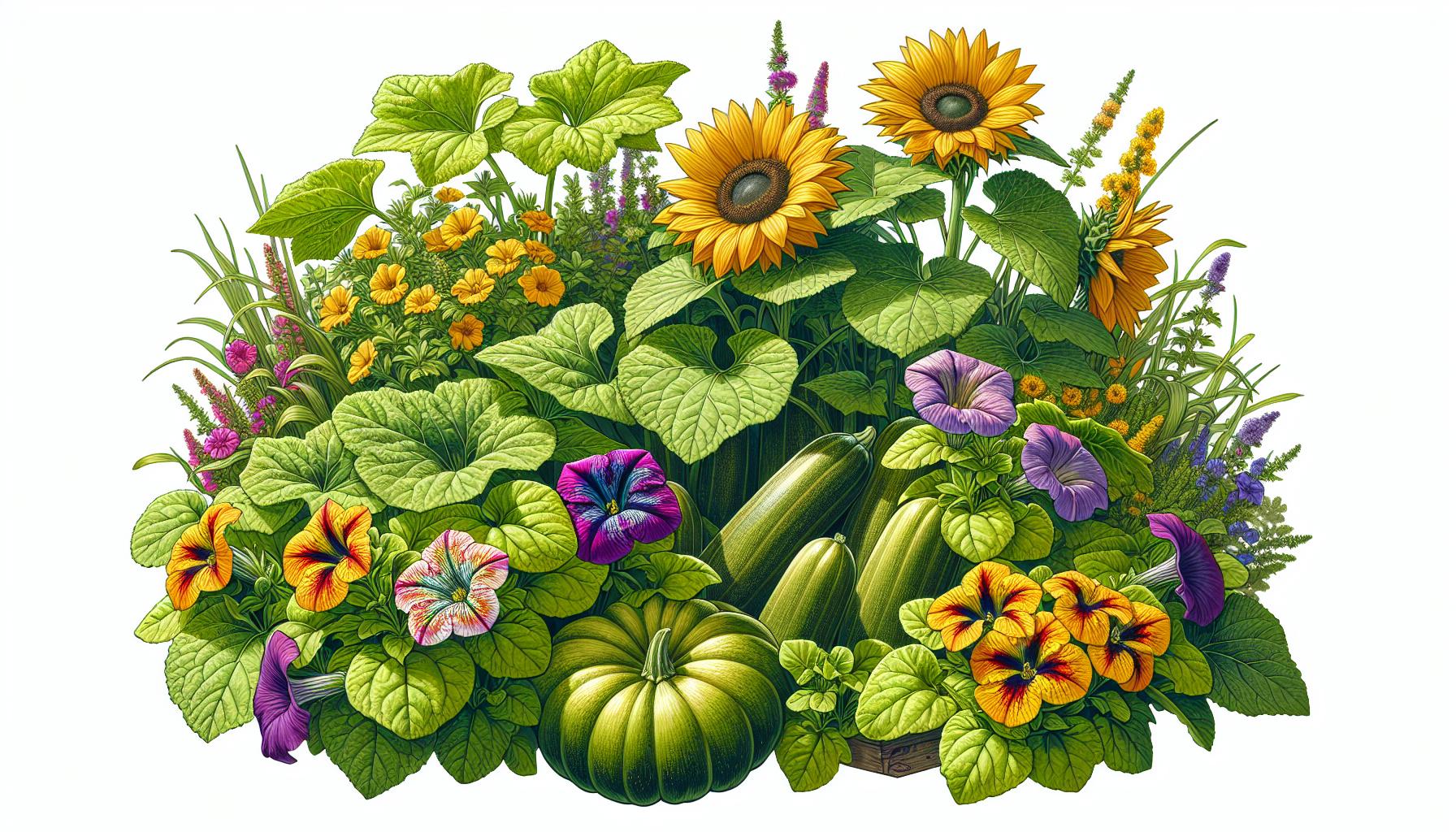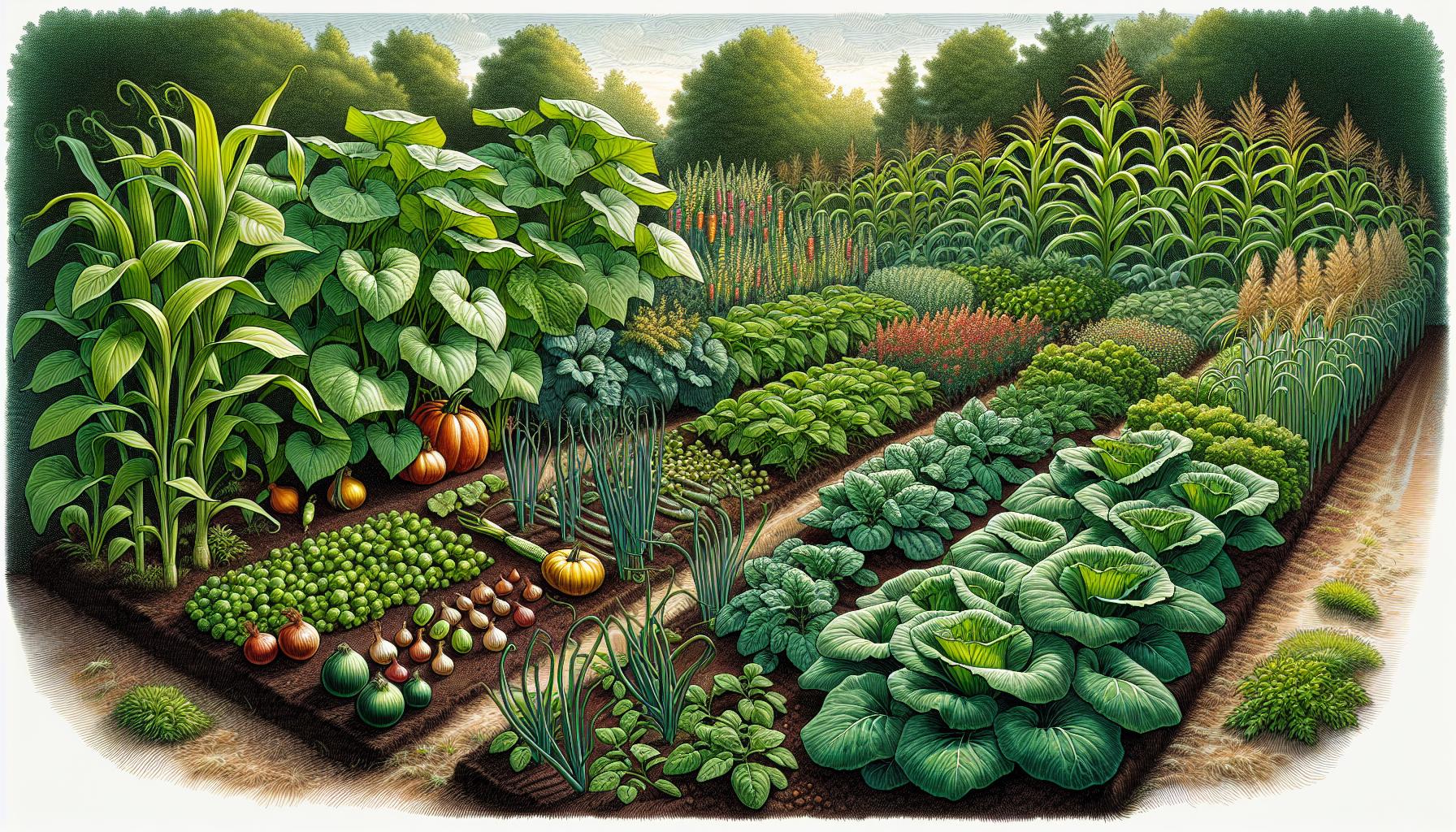
Growing squash in your garden can be a rewarding experience, especially when you discover the perfect companions to plant alongside it. Companion planting is a savvy way to enhance your garden’s health and yield. Certain plants, when grown together with squash, can deter pests, improve pollination, and even boost each other’s growth.
You might wonder what makes the best neighbours for your squash plants. Well, you’re in luck because there’s a variety of herbs, flowers, and vegetables that can coexist with squash to create a thriving garden ecosystem. Let’s explore the top companions that’ll not only support your squash but also bring out the best in your garden.
Why companion planting is beneficial for squash
Companion planting plays a crucial role in the success of your squash crops. By integrating certain plants alongside your squash, you create a symbiotic environment that yields numerous benefits. Here’s how these partnerships in your garden work to your advantage:
Natural Pest Deterrence
Certain plants act as natural repellents to common pests that plague squash. By embedding plants like marigolds and nasturtiums among your squash, you’re not just adding a splash of colour to your garden; you’re deploying a natural defence system. These vibrant blooms emit scents that deter pests like squash bugs and beetles.
Enhanced Pollination
Increasing the diversity of plants in your garden can attract a wider range of pollinators. By planting pollinator-friendly options like borage and lavender next to your squash, you draw in bees and butterflies which are essential for squash flower pollination and fruit set.
Soil Health and Nutrition
Companion plants can also improve soil conditions. Legumes, for instance, fix nitrogen levels in the soil, fostering an environment where squash can thrive with enriched nutrients.
Optimised Space Utilisation
Planting densely with companions such as corn or beans can maximise the use of garden space. These taller plants provide shade for the squash, reducing water evaporation and potentially improving yield.
Real-Life Application
In a study conducted by the Department of Agriculture, fields planted with a combination of squash and floral companions saw a 30% reduction in pest activity compared to mono-cropped squash fields. This showcases the tangible impact that companion planting can have on your garden’s health and output. Incorporating these techniques will not only help your squash flourish but also contribute to a dynamic and resilient garden ecosystem.
Herbs that make excellent companions for squash

When planning your garden, it’s crucial to consider which herbs will complement your squash plants. Herbs not only provide a fragrant addition to your garden but also offer several benefits when paired with squash.
Nasturtiums and marigolds, for instance, are brilliant for fending off common pests. Their strong scents act as natural repellents, keeping unwanted critters at bay. Also, planting these herbs can attract pollinators, which are essential for squash production.
- Nasturtiums: Repel squash bugs and beetles
- Marigolds: Deter nematodes and other soil pests
Integrating basil not only enhances the flavor of your squash when used in cooking but also promotes healthier growth. Basil has been observed to increase the vigor of squash plants, potentially due to its repellent effect on harmful insects.
- Basil: Improves plant health and repels flies and mosquitoes
Considering oregano, this herb functions as a general pest control agent, creating a safer environment for your squash to thrive. It’s especially useful in warding off the cabbage butterfly, which can be a problem for nearby vegetable plants.
- Oregano: Deters a myriad of pests, including cabbage butterflies
It’s also been noted in gardening communities that dill and parsley attract beneficial predatory insects. These insects, such as ladybugs and parasitic wasps, naturally keep pest populations in check, affording a more balanced garden ecosystem.
- Dill and Parsley: Attract beneficial insects like ladybugs
By incorporating these herbs into your garden, you’re utilizing natural means to improve the vitality of your squash plants. Not only will your garden be more resilient to pests and diseases, but you’ll also have the added bonus of a variety of fresh herbs at your fingertips. Remember to space the herbs adequately, ensuring they don’t compete with your squash for nutrients and sunlight.
Flowers that enhance the growth of squash plants

Integrating flowers into your squash garden not only adds beauty but significantly boosts your squash plants’ vitality. Flowers are not merely ornamental – they’re functional allies in your quest for a bountiful squash harvest.
Sunflowers stand tall as natural trellises for vining squash plants, offering support for the vigorous growers. They also draw in pollinators, ensuring your squash flowers are visited and pollination rates are high. This is critical as adequate pollination translates to more squash for you to enjoy.
Petunias emit an odour deterring squash bugs and other pests. This aromatic shield is a natural pest control strategy, reducing the need for chemical interventions. The vibrant petals of petunias attract a variety of beneficial insects as well, further fortifying your garden’s defences.
Incorporating zinnias into your vegetable plot is another strategic move. Known for their ability to lure ladybugs and hoverflies, these colourful blooms support your squash by keeping aphid populations in check – a common pest of squash. – Sunflowers – Provide structural support and attract vital pollinators
- Petunias – Naturally repel pests and add a splash of colour
- Zinnias – Attract beneficial insects that control aphid populations
By planting these flowers alongside your squash, you’ll create a synergistic environment where every element works together to ensure the others thrive. The presence of these specific blooms can make a significant difference to your squash plants, leading to healthier crops and potentially higher yields. Keep your garden diverse, and you’ll enjoy the rewards season after season.
Vegetables that can be planted alongside squash

When planning your garden layout, diversifying your plant selection by integrating different vegetables with your squash plants couldn’t be more beneficial. Here’s what you need to know to make an well-informed choice about which vegetables to pair with your squash.
Beans and Peas
Benefits abound when you plant beans and peas alongside your squash. They fix nitrogen in the soil, which supports the growth of your squash by enriching the soil with this essential nutrient.
- Beans repel pests like beetles and aphids which commonly affect squash.
- Peas climb and can create a living trellis, providing shade and support. ### Spinach and Lettuce
Cool-season crops like spinach and lettuce can thrive in the shadow of your squash plants. They require less sunlight and can benefit from the shelter provided by the larger squash leaves. This pairing utilizes the available garden space efficiently.
Onions and Garlic Including onions and garlic in your garden serves a strategic purpose. These alliums act as natural repellents for many pests that could harm squash plants, due to their strong scent.
Radishes
Radishes are excellent companions for squash due to their quick growth cycle. They are known to deter squash vine borers and other pests while being harvested before the squash needs more room to spread.
Corn
Just like the Native American “Three Sisters” garden arrangement, corn can be a fantastic companion for squash. The tall stalks provide shade and support for the sprawling squash vines, while the wide squash leaves shade the soil to help preserve moisture for the corn’s benefit.
Incorporating these vegetables not only enhances the overall health and productivity of your garden but also helps in maximizing the use of space and natural resources. Remember to consider the size and growth patterns of these vegetables to avoid overcrowding and to ensure all your plants receive adequate sunlight and airflow.
Conclusion
You’ve now got the inside scoop on creating a thriving squash garden with the help of companion planting. By integrating beans, peas, spinach, lettuce, onions, garlic, radishes, and corn, you’re setting yourself up for success. These plant allies not only boost soil fertility and ward off pests but also make the most of your garden space. Remember, a little planning goes a long way toward a bountiful harvest. So roll up your sleeves and start planting—your squash and its companions are ready to grow together.
Colin Macmillan is a seasoned entrepreneur and the CEO of Riverwood Landscape, a leading landscaping company based in Canada. He has been at the helm of the company since leaving high school, demonstrating his strong leadership skills and business acumen.
Colin’s expertise lies in various aspects of landscaping, including lawn care, interlocking, sod installation, and commercial maintenance. His hands-on approach and dedication to the craft have been instrumental in building Riverwood Landscape into a reputable brand.
One of his most notable achievements is the creation of a successful landscape franchise that services multiple locations. This accomplishment underscores his strategic thinking and ability to scale operations effectively.
Colin has also had the privilege of working with Guelph Hospital for landscaping and maintenance, a testament to the trust and reliability that his company has earned over the years.
His professional mission is to offer the best services and experiences for customers, a goal that he tirelessly pursues. Colin’s commitment to excellence and customer satisfaction continues to drive the growth and success of Riverwood Landscape.








